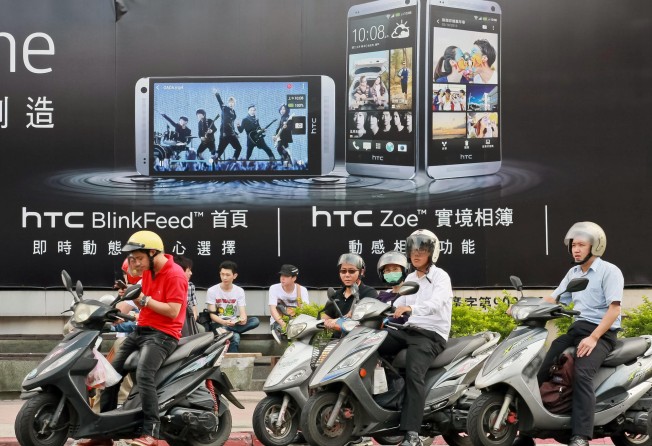‘Superphone’ not the One to lift earnings hope for HTC
Taiwan smartphone maker is likely to slip into red as the return on its well-received handset falls short of target amid tough competition

Taiwan's once-fast-growing flagship smartphone maker HTC is forecasting a possible loss this quarter despite interest in its latest "superphone" models, because of what analysts describe as tougher competition at the high and low ends of the world market.
The firm, which reported a 93 per cent surge in revenue in 2010, said last month that it expected zero profit or a loss of up to 8 per cent by the end of next month.
Profit has been stuck at about 1 per cent of revenue since the final three months of last year.
HTC reported income of NT$70.7 billion (HK$18.3 billion) for the second quarter, a year-on-year decline of 83 per cent.
The developer says its One handsets have been well received as they slowly reach markets this year and expects additional products in the pipeline to shore up business.
But the handsets, though technically solid, have failed to recoup research and development and marketing costs because of increased competition and the shorter lifespan of new devices, industry experts say.
"Sales didn't meet their expectations," said CK Lu, a smartphone analyst with market research firm Gartner in Taipei. "They spent a lot of money on marketing and [research and development], but the return didn't meet their target."
That is just the latest in a series of upsets for the firm since its global market share peaked at 10.7 per cent in early 2011.
Global smartphone sales grew to 230 million in the second quarter, market research firm Strategy Analytics says, on track by some estimates to top one billion for the first time this year.
HTC has found it harder to stand out at the high end against Samsung and Apple.
"At the high end, the lifetime of a new smartphone is only a quarter," Lu said. "[The One] is comparable to Apple and Samsung, but it's not better."
Mainland brands Huawei Technologies and Lenovo have eroded HTC's share of smartphones that retail for less than US$450. HTC will take a market share of 3 to 4 per cent this year, according to investment bank estimates.
The company also faces supply-chain obstacles for high-end parts, a tough retraining of workers to make new lines of smartphones and lost income from developing high-end components if the phones do not sell well enough, some analysts say.
HTC, which got its start in contract manufacturing for big-name foreign firms, should consider contracting some of its work outside Taiwan to save money, said Wilson Mao, a smartphone analyst with Taipei-based market research firm TrendForce.
Taipei-listed HTC declined to comment on its future performance, but a July 30 statement attributes financial setbacks to "relatively higher-cost structure, lack of economy of scale and certain provisions needed to facilitate the clearance of ageing products in the channel".
Experts in Taipei see no products that are momentous enough to turn HTC around this year. But the firm cites improved reception around Asia, with continued interest in the One.
"With the help of HTC One, we have regained superphone market share across major markets, including China," the company said. "We also have plans under way to launch a range of innovative and competitive mid-tier products in the coming months. We hope to regain momentum and market share in these segments" in the fourth quarter.
As management has been cited as another source of HTC's performance problems, the company said in July that it had made three "key" appointments, including a president and a senior marketing director for South Asia as well as a global public relations vice-president.
HTC said it would start buying back its shares from August 5, a move to support a stock price that has fallen because of a possible loss forecast this quarter. It planned to buy 15 million shares until October 4, local media said.
The firm would buy shares for NT$140 to NT$290 each. They were worth NT$149.50 yesterday.
The buy-back might signal HTC's confidence in its long-term performance, said John Brebeck, senior adviser with Quantum International in Taipei. "Typically, it's just a death spiral. Once you've become irrelevant, you're irrelevant," he said. "But I don't think HTC is irrelevant because they have a really good design team."